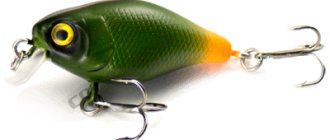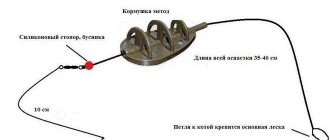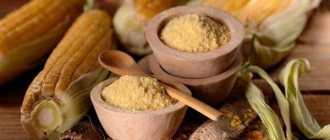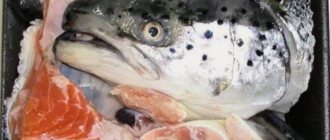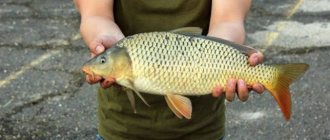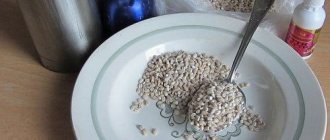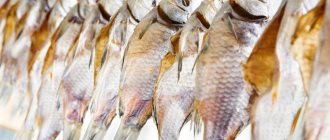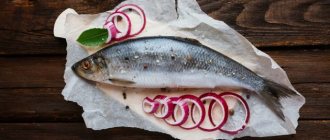Flavors for fishing are a relatively new trend in sport and recreational fishing, which has managed to gather many supporters over the course of several years. Today, many people use special substances designed to attract fish. They can be branded in the form of liquids, powders and sprays, or homemade.
Ready-made store-bought flavors contain the optimal ratio of aromatic components to attract a particular type of fish; the fisherman just has to choose the one he needs and apply it correctly. You can treat baits with proprietary compounds or add them to the bait mixture to guarantee a good catch. However, not every fisherman is ready to pay money for a small but expensive jar of the substance, and besides, there are now a lot of fakes that have no effect on fishing. Buying such a “magic remedy” means throwing your money away. That is why many fishing enthusiasts experiment with different scents, select effective combinations and prepare flavors at home.
Basic principles of flavoring
The open water season is usually divided into several periods, and each of them has its own flavors. In the spring, for example, underwater inhabitants respond better to spicy aromas, and when the water temperature begins to approach summer levels, they are replaced by sweet aromas. With the first autumn cold snaps, the taste of the fish changes, it again switches to the aromas of various spices. In cold water, as practice has shown, animal odors work best. But there are exceptions to any rule. The same flavors with odors of animal origin can be successfully used in catching catfish throughout the season, regardless of water temperature.
It is advisable to use summer fruit aromas at a time when similar fruits are ripening. In the first half of summer, aromas of strawberry, peach, and cherry are popular, and sweet dips with vanilla or caramel work great from the end of May until the fall. The latter showed themselves well in long-distance fishing (match, feeder). In general, it is better to go to a body of water with a whole arsenal of different flavors in order to be able to select an effective scent experimentally.
Reflections on the taste preferences of carp
Catching carp is interesting and exciting; even a beginner can catch it if you know what to attract. He smells even the smallest particles of bait in the water, revealing how tempting it is for him. Through experiments, it was determined that carp can easily recognize the smells of different amino acids that come from bloodworms, crayfish, and aquatic vegetation. The greatest nutritional value for it is provided by carbohydrates and amino acids found in the extract of green-lipped mussels, algae, liver powder, and molasses. If there are no such components in the food, the fish will ignore it.
How does carp know the taste of honey, garlic or vanilla?
There is no exact data on how carp know about the smells of these spices. He probably learned about them from fishermen. If, in addition to bloodworms and shells, you also use natural flavors, then the chances of catching trophy specimens will increase significantly.
We recommend reading: What is Shcherbakov’s nod: device, application, manufacturing
What about fishy smells?
The smell of fresh fish, despite the conditionally peaceful nature of carp, also has not lost its effectiveness. Pieces of sardines and canned tuna are often added to the bait. The main thing is that the product is not spoiled. Krill, salmon, shrimp, and belachan remain attractive to carp.
In every body of water, fish have their own preferences for smells and tastes.
Where hemp works, honey does not give the desired results. Among the popular ones, it is worth noting tuna flavoring, presented on the market in the form of pop-ups and boilies.
Work of attractants in different seasons
Depending on the time of year, the choice of flavors varies. During the cold season, you should be careful with odors. It's better to underdo than overdo.
In warm water
For carp fishing to be productive at a water temperature of 14 degrees, you should use:
- vanilla,
- cinnamon;
- chocolate;
- caramel;
- corn;
- honey;
- Tutti Frutti;
- fruit flavors (banana, plum;
- strawberries, peach.
A particularly interesting option for carp is corn molasses with betaine. It is used for processing boilies and canned corn grains.
In cold water
You can enjoy fishing early in spring and late autumn if you use:
- anise;
- garlic;
- hemp;
- cinnamon;
- shrimps;
- honey;
- maggots;
- shells;
- crabs
How to choose a flavor
The choice of flavor depends not only on seasonality; you also need to take into account the taste preferences of the fished object. Let's consider what the main fish of our reservoirs like.
Bream, bream, roach, silver bream and some of their closest relatives can be tempted:
vanilla;- strawberries;
- pear;
- honey;
- cinnamon;
- anise;
- garlic
The best branded flavors
Let's consider the rating of the most effective flavoring attractants:
Dry Blooder is a popular bite activator among professionals and beginners. It is used in both fresh water and sea water. Equally effective in cold and warm times, regardless of atmospheric pressure and other weather factors. It best attracts crucian carp, roach, carp, tench, and is also successfully used in catching pike and perch.- Fish Hungry is a universal bite activator that can be used in different ways: added to bait, processed with natural and artificial bait, diluted in water to then dip live bait in it. Suitable for any time of year and any fishing conditions. Main active ingredients: synthesized pheromones and essential oils.
- Fish XXL is a licensed spray activator with a unique code on the packaging. Once in the water, it begins to spread and attract fish from a great distance. The product irritates the olfactory organs and affects the nerve endings of the fish, forcing it to swallow the bait without any fear. Made from natural materials, it contains kaffir lime, garlic, hemp oil, and squid protein.
Mega Strike is the best assistant for spinners. After application to the bait, it gives it a natural smell and taste, turning an ordinary spoon practically into a live bait. It contains proteins, amino acids and some additional substances that the manufacturer keeps secret.- Sensas is a French fragrance spray, placed in small 75 g bottles. It has several different aromas that provoke specific fish: for crucian carp and carp - the smell of fishmeal, for barbel - the smell of cheese, and so on. The company also produces a universal option for catching most predators called Sensas Bombix Brasem. Fishermen claim that sometimes the aroma for one species “shoots” at another.
Flavors for fishing
Smell and touch are two senses that help fish in finding food. Experienced fishermen know that most fish have an exceptional memory for smells. They can quickly find, even without seeing, the source of the smell. Strongly smelling substances, the smallest particles of which spread almost as far in the water as in the air, attract fish from such distances where the bait cannot be seen. But fish react differently to different smells. A certain difficulty in using aromatic substances is that some smells attract fish, while others, on the contrary, repel them.
For example, for a long time, fishermen prepared “irresistible” baits flavored with anise, hemp, linseed and sunflower oil. It is known that fish are also attracted by the smells of goose fat, honey, and blood. And there are substances with such a smell that the fish literally “runs” from it. These smells alarm her, make her anxious, and scare her away. This is the case, for example, with the smell of dead fish, the smell of petroleum products, and nicotine. It is useful for smoking fishermen to know that a cigarette butt thrown into the water poisons it and scares away fish. Even if the cigarette butt does not fall into the water, the fish “recognize” the fingerprint of the smoker’s fisherman, which remains on the fishing line OR bait. Therefore, take care to keep your hands clean! Here is an example from the life of amateur fishermen.
Once I was fishing with a fishing enthusiast who went out to the pond from time to time and fished mainly with a summer float rod. And he, discussing what a real amateur fisherman should know, somehow casually said that everything was clear to him, etc., that all you need to do is put a worm on a hook, spit on it and Throw it into the water, and when it bites, hook the fish. He couldn’t answer my question why he spits on the worm... Like, everyone spits, and so does he. But in fact, it turns out that there is still a point in this “trifling” matter. The fact is that human saliva contains salt, the worm cannot tolerate it and begins to squirm, which attracts the attention of the fish. This means that it makes sense to spit, but if you smoke, then you cannot do this - the effect will be the opposite.
The mechanism of action of flavorings, most likely, has not been sufficiently studied, so amateur fishermen still have so many questions to which, unfortunately, there are no exact answers yet. Consequently, quite often you have to experiment, add flavors to bait or groundbait “at random”. But it’s probably worth agreeing with the opinion of experienced fishermen that, most likely, most fish, when moving, move from zones with a low content of substances that attract them to zones with a maximum content. This is one of the basics of bait and bait: the fish quickly finds on the bottom the place where something that exudes an attractive aroma is located.
Nowadays, abroad and in our country, flavorings have become firmly established in the arsenal of not only sports fishermen, but also amateur fishermen. Many companies engaged in the production of various fishing products have created a real industry for the production of flavors, fish bite activators, and other things. And they are used not only in their pure form, as they go on sale; fishermen often add additional components to their composition: various oils, ground seeds, etc. Of course, if you can hope that everything in the finished flavorings is thought out and their use will be It is precisely to attract, and not to scare away, fish, then when creating a complex flavor composition, some caution must be observed. The individual substances included in this kit may be incompatible. Separately, they can attract fish, but together they can repel fish, that is, such a flavor will work as a repellent. In this case, as and when the concentration of even a normal flavor is high, the fish will avoid this area and move away from the place where the fisherman is located.
Of course, most amateur fishermen know both from the stories of more experienced comrades and from literature that flavoring should be added to bait, groundbait or bait in minimal portions. But what? It is, of course, difficult to say without knowing what will be in the bait and what flavoring will be used. But here’s what experienced fishermen advise on this matter.
Fish are fed not only during open water, but also in winter. But it should be taken into account that the situation on the reservoir changes dramatically in winter. And if, for example, in the summer, fish sense odors using their sense of smell and react accordingly to the appearance of the source of these odors in the water, then in winter, under the ice, almost absolute silence is established in the water. And in this silence, the fish rely mainly on hearing - both in searching for food and in detecting danger. She is more likely to detect their location by the vibrations of the larvae than by some kind of smell. Of course, the sense of smell also plays a role when searching for food, but most likely it is a secondary one. However, even in winter, some amateur fishermen, when feeding fish, for example, with small bloodworms, sometimes specially crush them in order to attract the fish with the smell, but this does not always give a positive result. More playful and mobile small fish will most likely approach such crushed larvae and destroy the bait. But living larvae, plunging into the ground and emitting vibrations, are not always accessible to small fish, and one can hope that larger fish will react to these vibrations and approach their source.
Some fishermen store bloodworms frozen for a long time. Of course, you can use it for fishing, but after thawing it loses its motor ability and retains only its external attractiveness for fish.
In conclusion, I would like to acquaint amateur fishermen, especially beginners who use various flavorings when preparing bait, with the comments of experienced sports fishermen. When using some types of essences, you need to know that in the summer, at high water temperatures, they can attract fish within a radius of 200-250 m, even in still water. And this is in small doses. The disadvantage of essences is the difficulty of their correct dosage - 3-5 extra drops can ruin several kilograms of well-balanced multi-component bait and scare away, rather than attract, fish. Powdered flavors are less soluble in water, but they are easier to dose. But when using aromas such as raspberry, bird cherry, apple, lemon, various types of plant pollen and flowers, it is necessary to take into account the season of their use, accurate to within a few days, when a given shrub or flower blooms or finishes blooming. Hormonal supplements that give a positive effect, for example, when fishing for perch, are also complex.
Liked? Share with your friends!
Liquid and dry flavors
Liquid flavorings include dips and sprays. The concept of “dip” appeared thanks to carp fishing enthusiasts, who began to immerse boilies in the odorous liquid to give them a rich smell and pleasant taste. A carp that approaches the treated bait will certainly want to try it. Nowadays, deepening is used not only in carp fishing; it has been adopted by float fishing enthusiasts and feeder fishermen. They dip the plant baits in a sweet solution and send them to the fishing point, where the fish have already gathered for bait. It is important that the dip makes the bait stand out against the background of the bait mixture; it must be stronger than the bait attractant. In float fishing, you can flavor the bait directly during its preparation.
Dipping some baits and baits, such as a worm, maggot or mastyrka, does not give the desired effect, so flavorings in the form of alcohol-based sprays were invented for them. After spraying, the alcohol quickly disappears, and the attractive smell remains and stays on the bait for a long time. Meat and fish sprays deserve special praise. They have proven themselves best in catching bottom predators that rely more on their sense of smell when hunting (catfish, burbot).
Dry substances are often used to flavor baits.
Brand-name supplements are usually sold in packets that have detailed instructions regarding their use.
Anglers who don't want to spend money make aromatic powders from home-collected, dried and crushed plants. Everyone determines their own set of herbs based on their own experience. The bait can also be flavored with cinnamon, vanilla sugar, cocoa powder and other suitable bulk substances.
Flavoring sprays
For fishing to be successful and the catch to please the fisherman, it is necessary that the fish be in the fishing zone for a significantly long period of time. This can be achieved with high-quality bait, bait and flavors. A fishing fragrance in the form of a spray will help lure fish to the right place and keep it there for a long time. A flavoring agent is a special liquid that has very attractive odors for different types of fish, which is used to impregnate ready-made baits and baits to give them a new aroma.
Flavoring sprays can be used to make your own bait from the ingredients available to you. When using artificial baits, the use of flavoring is simply necessary. If such a bait is not impregnated with flavoring, then there will be no successful catch. Fish reacts very seriously to odors, and it is unlikely to swim up to a simple piece of rubber.
Sprays can be used to impregnate various types of nozzles and PVA materials. It is better to apply a spray before each cast, especially when fishing in reservoirs with strong currents, as the smell quickly evaporates and is washed out in the water. Just press the spray nozzle a couple of times, and your nozzle or PVA will acquire the desired aroma. The use of a spray is very effective because it does not require long soaking. We can control and change the smell before casting the tackle. In this way, you can experiment and find the right aromas that the inhabitants of the reservoir will like most.
Sprays do not spill and do not stain clothes and hands. In addition, the dispenser dispenses a standardized portion of the attractant, which saves its consumption and your money.
Types of fragrance sprays
All sprays can be divided into odor categories:
• Smells of specific spices and spices
• Fruity smells
• Milk and caramel smells
• Smells of meat, fish and insects
Each type of fish will be affected differently by each scent. In some reservoirs, bream actively respond to the smell of spices, but crucian carp and carp, not so much. In other bodies of water it’s the other way around. Therefore, it is difficult to identify a strict relationship between fish species and odors. During different seasonal periods, the same type of fish will react differently to the same smell.
Flavoring sprays can be purchased in our store. The prices for all varieties of this product will pleasantly surprise you with their affordability. All our products are of very high quality; we cooperate only with trusted suppliers. We offer products only from trusted manufacturers. Here you will find a wide range of different scents. Our store always has low prices, free delivery to any region of Russia and the CIS countries and special conditions for our regular Smart customers.
By using the right flavors you can always lure fish to the right place and, accordingly, increase your catch. Buy fragrance sprays from Smart Fishing and enjoy a pleasant fishing trip.
How to make it yourself
Many advanced fishermen have learned to make both dry and liquid flavors for fishing with their own hands. Many aromatic plants grown in summer cottages are suitable for preparing dry mixtures. These are fennel, lemon balm, coriander, mint, cumin, dill, garlic, anise. You just need to collect them, dry them completely and grind them. Everyone calculates the proportions themselves.
An alternative option is alcohol flavorings for fishing, which, like dry ones, are stored for quite a long time. You can pour dried herbs (for example, dill, cloves, anise) with alcohol (vodka), shake the contents of the container thoroughly and leave for 2.5-3 weeks. It is important that the jar is made of dark glass, which protects the product from sunlight. The components of homemade flavoring, as well as their concentration, can be changed at your discretion.
